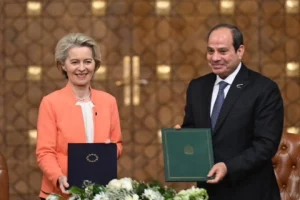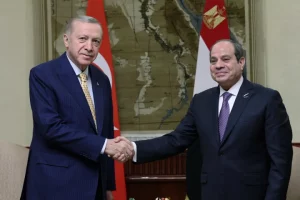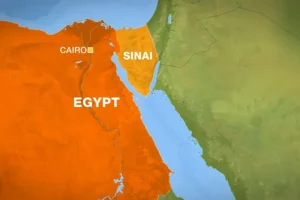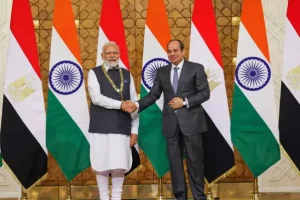Egyptian President Abdel-Fattah el-Sisi is likely to win a third term as voting began for presidential polls on Sunday. The polling is being held in the backdrop of Israel-Hamas war in Gaza, the immediate neighbourhood of Egypt and that will determine several future courses of events in the country.
In 2019, a constitutional referendum in Egypt resulted in the extension of the presidential term to six years.
The vote in the country of nearly 106 million people will run until Tuesday, with results expected to be announced on December 18. Former army chief Sissi has been president since 2014, a year after deposing Islamist president Mohamed Morsi.
Apart from war in Gaza, Egyptian neighborhoods in Sudan and Libya are also simmering, with aftershocks of the conflicts trickling into Egypt as well. Then, there is the question of the Egyptian economy that has been in a tailspin for several past years and Cairo has sought financial assistance from a number of international quarters.
In 2022, public debt in Egypt stood at above 88 percent of the country’s GDP, more than double the region’s average. Inflation has consistently been above 35 percent since June.
Across the country, as household finances shrink, record numbers of Egyptians are reportedly searching for a second job while cutting back on household spending, including less and cheaper food.
Incumbent Abdel Fattah el-Sisi is likely to secure a third term in the upcoming presidential elections despite Egypt facing a severe economic crisis https://t.co/G4nvrfXk4g pic.twitter.com/afNhCMsFDX
— Al Jazeera English (@AJEnglish) December 10, 2023
Domestic production in Egypt struggled to meet the demand of the Middle East’s most populous country even before Russia’s invasion of Ukraine in February 2022. The ensuing international grain shortages pushed what was already a food crisis into an existential economic threat.
Price rises on Egypt’s basic subsidised goods put them beyond the reach of many. According to government figures from 2020, the most recent available, the poverty rate had reached approximately 30 percent.
The Egyptian pound has plummeted to about 50 against the US dollar on the black market, as opposed to an official rate of 31.
Debt repayments, due to start next year, stand at $42.26bn, and many analysts expect austerity measures might be introduced once the election has passed.
Over the last decade, the United Arab Emirates and Saudi Arabia have extended millions in credit lines to a beleaguered Cairo. The IMF has extended a loan of $3bn, the fourth such instance of support in the last six years.
Despite such grim scenarios, nevertheless many analysts expect el-Sisi to win the election.
Besides economic woes, the problems in neighbourhoods and Egypt’s failure to assert its influence is also likely to echo in the election. In fact, in Egypt’s neighbourhoods like Gaza, Sudan and Libya, other countries like Turkey and Iran have larger sway than Egypt. Egypt is largely seen as a facilitator of international consensus like helping in maintaining ceasefire or talks among warring parties.
“What was once the foremost power within the Middle East has seen its regional and international relevance slip,” said Riccardo Fabiani, a project director at the Crisis Group, Egypt.
But some analysts point to the pivotal role Cairo has played during negotiations between Israel and Hamas and in securing new aid for those besieged within Gaza. They add that as the war in Gaza will move towards endgame, Cairo’s utility will put it as a major player in ensuring welfare of Palestinians and manager of international aid for them.
The last elections in Egypt, in 2014 and 2018, with varying turnout, both returned a vote of 97 percent in support of President el-Sisi. On December 18, Egypt will likely deliver another victory for him.




















